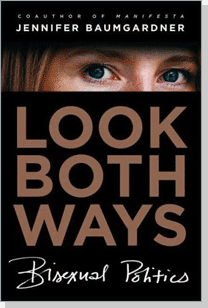Look Both Ways: Bisexual Politics

In Look Both Ways: Bisexual Politics, Jennifer Baumgardner, co-author of third wave bestsellers Manifesta: Young Women, Feminism, and the Future and Grassroots: A Field Guide for Feminist Activism, discusses the increasingly popular decision of women to date members of both sexes and the ties that bisexuality has to feminism. Part personal memoir, part social commentary, Look Both Ways allows the women that Baumgardner included in the book to talk openly about their sexuality and explore the potential boundaries put up by patriarchy and politics.
Baumgardner is an entertaining and engaging writer especially as she shares her own personal relationships with both men and women—including Amy Ray of the Indigo Girls. I was touched by many of her personal stories, particularly her concerns about losing the camaraderie that she had built with GLBT and feminist audiences when she transitioned from dating a woman to dating a man. The stigma that bisexual women are only adequate when single or when dating other women continues to be an issue. She also includes valuable reflections from second wave feminists who joined the women’s rights movement and, in turn, fell in love with other women in the sisterhood. An entire chapter is dedicated to folk-rock goddess Ani DiFranco, who is considered one of the greatest bisexual role models for other women who “look both ways.”
I applaud this book because it fills an enormous void in the mainstream publishing world and in our dialogue on sexuality, as a whole. Bisexual women are virtually invisible in our society—unless you count media stunts such as Madonna and Britney’s lip lock on MTV. According to Baumgardner, bisexual women serve a very important purpose in the gay rights movement because they stand on both sides of the gay/straight divide. Bisexuals understand the heterosexual privilege that comes with dating men and the injustices that often occur when they look the other way. I am sure that many will lament the omission of certain topics (such as the role of bisexual men in our society), but I can only hope that this book becomes as equally important and personally transformative as Baumgardner's other feminist texts.
Hey Shelby- We definately support you buyign this book from a feminist or woman-run bookstore. We get a portion of the proceeds from Amazon.com so if you buy it by clicking the link you're helping to support Feminist Review. If you come across any feminist bookstores that have this type of program, we'll gladly work with them instead of Amazon.com.Peace,Ama LeeFounder & Editor
This book looks intriguing to me, and I plan to purchase it. Unfortunately, when I clicked the link listed to buy the book, it took me to Amazon. While Amazon has better prices and have books in stock, I'd much rather support a feminist bookstore. I might have to wait a little longer to get my book and pay a little more, but definitely find it worthwhile to support the feminist community.
Kerri-Thanks for your review of this book. I wouldn't have known about it if I had read the review of it here. Unfortunately, self-identified bisexuals face a lot of pushback from both the straight and the gay community. I was formerly employed by the Human Rights Campaign (HRC) in Washington, DC and was both shocked and dismayed to discover that it was one of the most biphobic places I have ever worked. The comments I heard my co-workers say about bisexuals (and--another problematic issue for the HRC--transgender individuals) was outright inapporpriate and disgusting and, among other things, expedited my leaving the organization. As a self-identified queer woman, I found I was afraid to come out while employed by the HRC--something that is definitely a huge problem given their status as the champion of LGBT-rights in the U.S.This is all to say that your review prompted me to think about the status of various identities within the gay community and how, even here, not all are treated equal. I will definitely pick up a copy of the book. --Lacey D.